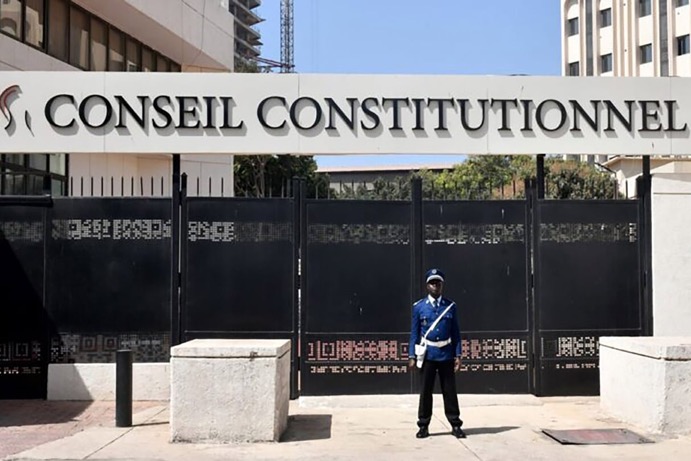Gambiaj.com – (Dakar, Senegal) – In a landmark decision reaffirming the balance of power within Senegal’s democratic institutions, the Constitutional Council has invalidated several core provisions of the recently adopted internal rules of the National Assembly, citing violations of the country’s Constitution.
The ruling, delivered on July 24 and made public the following day, nullifies a range of measures from the loi organique n° 09/2025, adopted by 138 of 165 MPs on June 27.
The Council’s decision, numbered 2/C/2025, comes after a referral by President Bassirou Diomaye Faye on July 7, indicating high-level concerns about the compatibility of the reform with Senegal’s foundational legal principles.
Judicial Independence and Parliamentary Overreach and Rights Violations
At the heart of the Council’s ruling are concerns about the legislative branch encroaching upon judicial independence and executive prerogatives.
Most notably, Article 56, which authorized the president of the National Assembly to compel individuals to appear before parliamentary commissions of inquiry using public force, was partially struck down.
The Council deemed such coercive power unconstitutional unless the appearance is entirely voluntary and strictly limited to matters related to the administration of the public justice service—not to ongoing or past legal cases.
The decision also imposes significant constraints on how magistrates can be involved in parliamentary investigations. It requires voluntary appearance only, strict focus on justice administration, excluding active or adjudicated cases, and prior authorization from the Minister of Justice.
These restrictions aim to protect the judiciary from undue influence or political scrutiny that could undermine its independence.
Direct Prosecutorial Action Blocked for Institutional Imbalance
Another pivotal article, Article 57(4), which allowed commissions of inquiry to refer alleged infractions directly to the Public Prosecutor, was entirely invalidated. The Council stressed that such authority is constitutionally reserved for the executive branch.
In bypassing the government, the Assembly would have blurred the line between legislative oversight and prosecutorial function—an overreach the Council deemed incompatible with Senegal’s constitutional framework.
Structural Oversight and Institutional Representation
The ruling also nullifies Articles 133 to 136, which dealt with how the Assembly designates representatives to external bodies and the procedures for renewing the members of the High Court of Justice.
These provisions were deemed to infringe upon established legal norms governing institutional representation and the separation of powers.
The ruling marks a political setback for National Assembly President Malick Ndiaye, who has championed the internal reform since assuming office in December 2024.
The initiative was notably supported by MPs Mohamed Ayib Salim Daffé (PASTEF), Aïssata Tall (Takku Wallu Sénégal), and independent lawmaker Tafsir Thioye.
Although the reform passed overwhelmingly in the legislature—with no votes against and just one abstention—the Constitutional Council’s censure underscores the limits of legislative authority in redefining institutional roles without breaching constitutional guardrails.
A Reminder of Constitutional Boundaries
The Council’s decision sends a clear signal about the sanctity of judicial independence and the structured distribution of powers under Senegal’s Constitution. In doing so, it reinforces the country’s legal architecture at a time when legislative activism and political recalibrations are shaping a new era of governance.
As political actors absorb the ruling, the broader lesson remains: institutional reform, however ambitious, must operate within constitutional constraints or risk invalidation.










